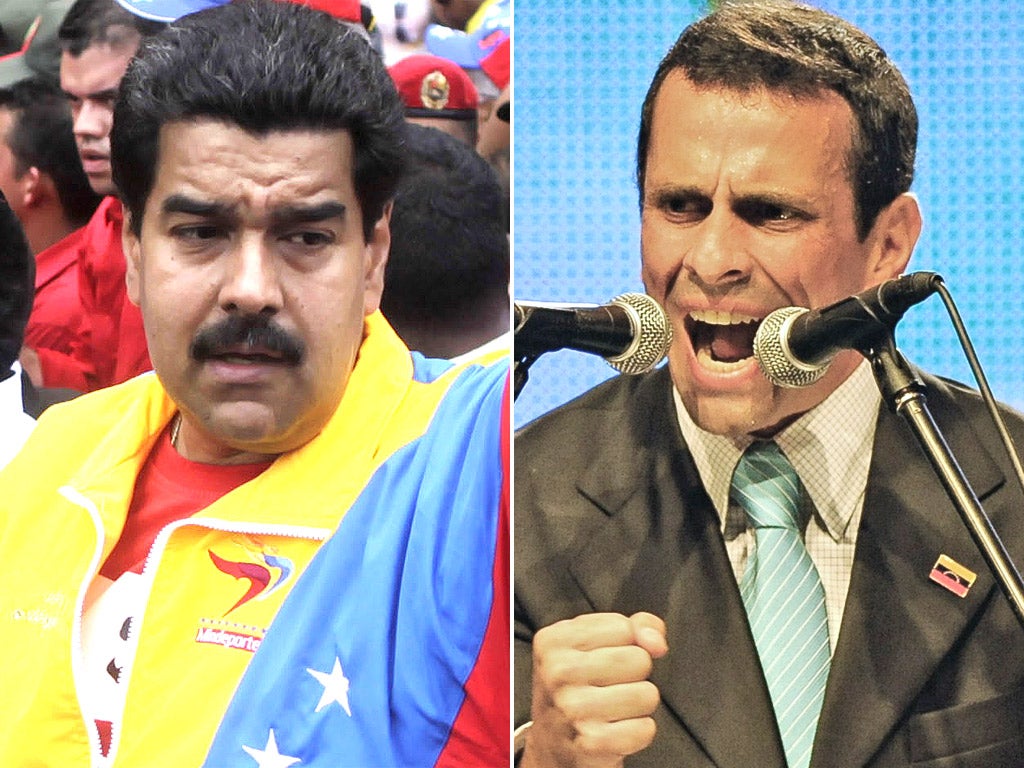Anointed heir of Hugo Chavez faces competition for the poisoned chalice
Interim President Nicolas Maduro faces a battle to succeed El Comandante

After 14 years of being dominated by Hugo Chavez’s bombastic and idiosyncratic personality, Venezuela now faces huge political uncertainty.
In the short-term, presidential elections are likely to be called for April, pitting Vice President Nicolas Maduro against the opposition candidate Henrique Capriles, the youthful state governor who lost last to the late Mr Chavez in elections last October.
The Venezuelan constitution stipulates that new elections must be held within 30 days of the president dying. Mr Maduro, 50, would enter that race with a series of strategic advantages, including the backing of the state media empire built up by Mr Chavez – there is now just one private TV station critical of “Chavismo” left in Venezuela – and the potential for a huge outpouring of public grief sweeping him to power.
Venezuela’s working classes also have every incentive to vote for a continuation of the “Bolivarian” socialist revolution that has seen lavish – and, critics say, unsustainable – spending of the country’s petrodollars on social programmes for the poor.
Yet, the Vice President may not have it all his own way. Even his most ardent supporters would concede that the former bus driver and union leader lacks Mr Chavez’s panache and common touch. And Mr Capriles, a basketball-playing, 40-year-old singleton, has proven an effective campaigner with the stamina necessary to hit the stump across the country, the only way for him to outflank the government’s control of TV coverage.
While Mr Chavez and his supporters had routinely branded Mr Capriles an “oligarch” and even a “fascist”, the opposition leader portrays himself as a pragmatic centrist with a social conscience, who, if elected, would halt the huge give-aways of Venezuela’s oil wealth to leftist allies such as Cuba and Bolivia and realign Caracas with “democracies” rather than the likes of Iran and Syria.
There are several possible alternative scenarios, should in-fighting break out either in the ruling United Socialist Party of Venezuela (PSUV) or the opposition.
The assembly leader Diosdado Cabello, an abrasive Chavista hard-liner, might yet decide to challenge Mr Maduro for the PSUV candidacy.
According to the Venezuelan constitution it is the assembly leader who stands in for the president if he is incapacitated before his inauguration but the vice president who does so afterwards. At the moment, Mr Maduro has taken the reins despite the fact that Mr Chavez missed his swearing in ceremony on 10 January due to ill-health.
Meanwhile, Mr Capriles still has formally to be chosen as the united opposition candidate, although it seems unlikely he will be cast aside after his performance last October, the best ever by an opposition politician against Mr Chavez.
Yet the biggest question may be: why anyone would want to succeed “el Comandante”?
In the run-up to October’s elections, Mr Chavez stoked up the economy. Inflation is now among the highest in the world and last month Mr Maduro was forced to devalue the bolivar for the fifth time since it was fixed in 2002, from 4.3 to 6.3 to the dollar. Yet with the black market rate still near 20 bolivars, many economists fear more turmoil.
Chavez’s successor: The contenders
Nicolas Maduro
When President Chavez named his 50-year-old Vice-President and Foreign Minister as his preferred successor last year, he described the former bus driver as “a complete revolutionary, a man of great experience despite his youth, with great dedication and capacity for work, for leading, for handling the most difficult situations”.
Mr Maduro has quietly managed to hold the reigns since December, and with the bombastic Mr Chavez out of the public eye, the Chavez camp has helped carve out his image as Venezuela’s next leader.
Henrique Capriles
A lawyer by training, the energetic 40-year-old is the most likely choice to challenge Mr Maduro in a snap election, in view of his performance against Mr Chavez in October’s presidential poll.
As the energetic governor of the state of Miranda, Mr Capriles campaigned across the country, building support from the grassroots upwards in the face of Mr Chavez’s dominance of state media. If a vote did take place, it is thought Mr Capriles could improve on the 44 per cent of votes he won in October, against Mr Chavez’s 55 per cent.
Subscribe to Independent Premium to bookmark this article
Want to bookmark your favourite articles and stories to read or reference later? Start your Independent Premium subscription today.

Join our commenting forum
Join thought-provoking conversations, follow other Independent readers and see their replies